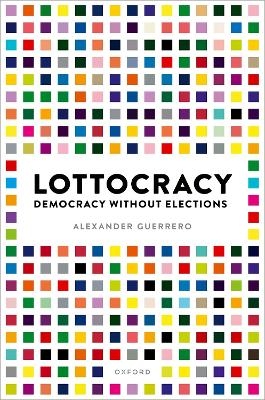
Lottocracy
Oxford University Press (Verlag)
978-0-19-885636-8 (ISBN)
Democracy is in trouble. What is going wrong? What should we do?
Lottocracy argues that, perhaps surprisingly, the problem is with the heart of modern democracy: the election. Elections are failing as accountability mechanisms. Elections provide powerful short-term incentives, leading elected politicians to downplay long-term catastrophic concerns. Elections create division where none need exist. The most powerful among us take advantage of this to control who is elected, what policies are enacted, and which problems are ignored. Policy complexity, citizen ignorance, elite capture and manipulation, algorithmically reinforced echo chambers, intensifying partisan division and distrust, and the dissolution of political community combine to render modern electoral democracies incapable of helping us solve the urgent problems we face. What should we do?
Alexander Guerrero takes seriously the possibility that although electoral democracy has been better than all systems that have been tried, the basic mechanism at its core-the election-is broken, and unworkable under modern political conditions.
Lottocracy moves past the Churchillian shrug ("the worst system, except for all the others"), introducing a new form of democracy: lottocracy. Lottocratic systems include many new elements, but the most striking is the shift from using elected representatives to using representatives selected through lottery. Guerrero introduces and discusses lottocratic systems, their potential advantages, and potential concerns. The argument engages with foundational philosophical questions, considering how rights of political participation, political equality, political power, considerations of accountability and legitimacy, and the nature of democracy itself are illuminated and reconfigured once we move past the electoral representative framework.
Alexander Guerrero is Professor of Philosophy at Rutgers University - New Brunswick. He writes about topics in moral philosophy, political philosophy, legal philosophy, and issues in epistemology that intersect with those areas. He is the recipient of the Lebowitz Prize from the American Philosophical Association and Phi Beta Kappa. He regularly teaches courses in African Philosophy, Chinese Philosophy, Latin American Philosophy, and Native American and Indigenous Philosophy. He is Editor-in-Chief of Philosophy Compass and an Associate Editor of Ethics. He has a JD from NYU School of Law, a PhD from NYU, and an AB from Harvard College.
Part One: Problems with Electoral Democracy
1: How to Evaluate Political Institutions
2: Ignorance and The Voter Influence Dilemma
3: Bad Press
4: Vicious Partisanship
5: Short-term Bias
6: Unrepresentative Representatives
7: Modest Reponses and Their Limitations
Part Two: Lottocracy: A New Kind of Democracy
8: Introduction to the Use of Random Selection in Politics
9: The Lottocratic Alternative
10: Experts
11: Deliberation and Discussion
12: Single-Issue Legislatures
13: Overcoming Ignorance, Improving Epistemic Performance
14: Lessening Distortion, Improving Agential Performance
15: Lottocracy, Democracy, Legitimacy, and Political Morality
16: Lottocracy and Political Minorities
17: Getting There from Here
| Erscheinungsdatum | 11.09.2024 |
|---|---|
| Verlagsort | Oxford |
| Sprache | englisch |
| Maße | 165 x 242 mm |
| Gewicht | 866 g |
| Themenwelt | Geisteswissenschaften ► Philosophie ► Ethik |
| Sozialwissenschaften ► Politik / Verwaltung ► Politische Theorie | |
| Sozialwissenschaften ► Politik / Verwaltung ► Staat / Verwaltung | |
| ISBN-10 | 0-19-885636-9 / 0198856369 |
| ISBN-13 | 978-0-19-885636-8 / 9780198856368 |
| Zustand | Neuware |
| Haben Sie eine Frage zum Produkt? |
aus dem Bereich


